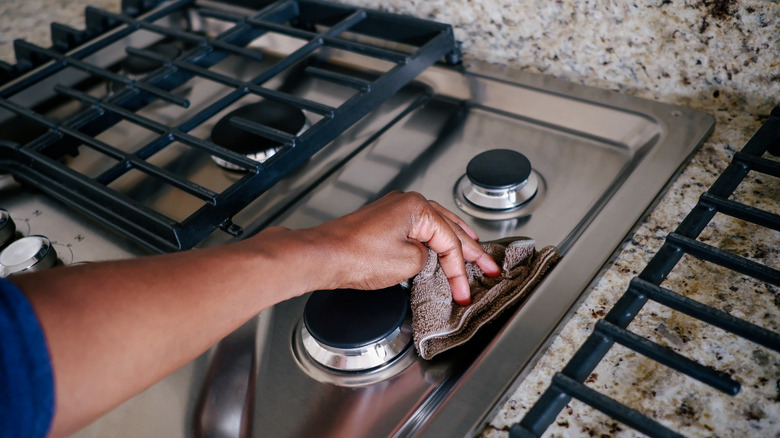Can This Unexpected Kitchen Ingredient Be The Key To A Spotlessly Clean Stove?
We may receive a commission on purchases made from links.
If you are on the hunt for natural cleaning ingredients to tackle that stubborn stain on your stove, you may not need to head to the store for a bottle of chemical cleaner. In fact, the solution might already be waiting for you in your own pantry: that tiny can of tomato paste. While there are household essentials to keep your stove shiny, you probably wouldn't expect to find these in the produce aisle. But thanks to Instagram user @steelpan.guy, tomato paste's unexpected cleaning powers have earned it a place in some natural cleaning ingredient lineups. But can it really clean your stove?
The answer? It depends. Fresh tomatoes are around 4.0 on the pH scale, meaning they are relatively acidic. Tomato paste — concentrated paste made of tomatoes — has a lower pH, starting around 3.5, meaning it's more acidic. Thanks to this acidity, tomato paste can be a powerful kitchen cleaning ingredient to remove gunk on glass and stainless steel stoves.
How to use tomato paste to clean your stove
The cleaning process differs depending on what kind of stove you have. For glass stovetops, grab a 0000 steel wool pad like these PAMI wool scrubbers, add some tomato paste, and gently scrub over the stove surface. Stains and discoloration should easily come off. Then, wipe the tomato paste off with a clean towel, spray with a glass cleaner, and you're done! For a stainless steel stove, put the tomato paste on a sponge — ideally one with a scrubber side — and apply to the stain. Both methods may take a little elbow grease, but the result is worth it. Plus, if you have any tomato paste left over, rub some on discolored stainless steel pans and scrub with your dish sponge to make them look like new!
What about if you have a ceramic, cast iron, or induction stove? Be careful or consider skipping this cleaning ingredient. The high acidity in tomato paste may scratch, damage, or possibly corrode your appliance. While we found some stories that tomato paste cleaned non-stainless steel or glass stoves safely, there is little scientific evidence to back it up. If you have one of these stoves, there are great all-natural cleaners that will get your stovetop good as new.
